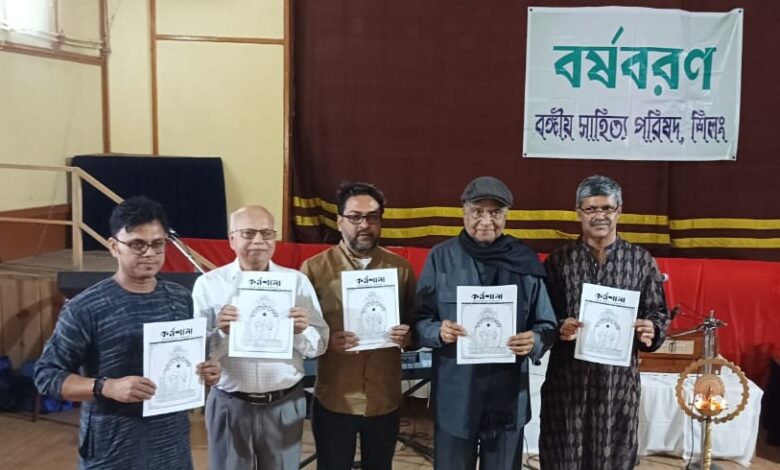Indian New Year: A commitment towards conservation & sustainability of Mother Nature

 Over the past week, my father gave me several reminders for getting neem leaves and raw turmeric (kachcha haldi) home. This despite the fact that our WhatsApp group of college friends was already exchanging greetings of Bihu, Bengali New Year and Baishakhi to one another well in advance.
Over the past week, my father gave me several reminders for getting neem leaves and raw turmeric (kachcha haldi) home. This despite the fact that our WhatsApp group of college friends was already exchanging greetings of Bihu, Bengali New Year and Baishakhi to one another well in advance.
This was required for homemade preparation of having all of these together on Sankranti (the beginning of a new month according to the solar calendar) on April 14 (Assamese New Year or Bihu) and again on April 15, the Bengali New Year or Poila Baisakh. This is a tradition in Bengal to crush the neem leaves and raw turmeric together and mix it with mustard oil to apply it on the body. Ayurveda states that as humidity increases, these natural herbs can prevent aggravating skin infections.
As one goes deeper into this, one never misses the intricate bonding between nature and humankind. One of the significant aspects of this Indian New Year is its close association with agriculture and the conservation of nature.
As primarily an agricultural country, the new year celebrations are also a way of thanking Mother Nature for her blessings and seeking her continued support. From offering rituals to the Sun God through ‘Surya Namaskar’ (salutations) to worshipping trees, water bodies, animals, the diversity of traditions and culture is what binds people together. Between March and April, this celebration brings great enthusiasm across the country.
Another important tradition associated with the Indian New Year is the preparation and consumption of traditional sweets and delicacies using seasonal fruits and vegetables. The celebration of the New Year in India is a significant event, as it marks the beginning of a new cycle of life, prosperity, and hope.
Some of the prominent festivals are as follows:
Baisakhi
Baisakhi is celebrated in the northern part of the country. This festival is also known as the harvest festival of Punjab. It falls on the first day of the Baisakh month, which usually falls on April 13 or 14, according to the Indian calendar. The farmers are seen dressing up in their traditional attire and performing Bhangra and Gidda, a lively and energetic dance form, to celebrate the harvest season. The festival marks the Sikh New Year and the establishment of the Khalsa Panth, a Sikh brotherhood that was formed by Guru Gobind Singh in 1699.
Bihu
Bihu is celebrated in the northeastern state of Assam with a three-day festival that marks the beginning of the Assamese New Year. Several rituals, such as bathing the cattle and decorating them with flowers and new clothes; people buying and wearing new clothes; enjoying delicacies with songs and dance, mark this traditional festival as the farmers renew their commitment to agriculture, which is the basis of the festival.
Poila Boishak
The Bengali New Year, also known as Poila Boishakh, is a festival that brings joy and celebration, with people wearing new clothes, decorating their homes with flowers, and enjoying traditional Bengali delicacies. They also participate in cultural events and performances, such as the Panta Bhat festival, (a traditional Bengali meal of rice soaked in water and seasoned with spices and vegetables).
Pana Sankranti
Conservation of wildlife and the environment is another commitment that is renewed during this time in Odisha. The festival is called Pana Sankranti, as it marks the beginning of the summer season and the flowering of the mango tree. People offer a sweet drink called ‘pana’ to passers-by, symbolising the sharing of love and goodwill. They also perform a ritual called Jala Abhishek, where they offer water to sacred trees, as an offering to the Divine Mother.
Puthandu
Considered the first day of Tamil month, people wish each other Puthandu Vazthukal (meaning Happy New Year). Different delicacies such as Mangai Pachadi, made of raw mangoes, jaggery and neem flowers are prepared. The Pachadi symbolises the ups and downs of life and reminds people to face them with equanimity.
Ugadi or Gudi Padwa
Ugadi or Gudi Padwa marks the beginning of the new year and the agricultural season and is celebrated with great fervour in the states of Andhra Pradesh, Telangana, Karnataka, and Maharashtra. The name Ugadi is derived from the Sanskrit word yugadi, which means the beginning of a new era. On this day, people decorate their homes with mango leaves and perform a ritual called Ugadi Pachadi, which is a mixture of six tastes — sweet, sour, salty, bitter, spicy, and astringent. In Maharashtra, people celebrate ‘Gudi Padwa’ by hoisting a gudi or a flag made of neem leaves, flowers and a copper vessel representing the victory of good over evil and celebrating the victory of Chhatrapati Shivaji.
Vishu Kani
In many parts of the country, people celebrate the occasion by planting trees and saplings. This tradition is known as Vishu Kani in Kerala where people place potted saplings in their homes as a symbol of growth and prosperity. The Kani is believed to bring good luck. The festival also marks the beginning of the fishing season in Kerala, and people celebrate it by cooking a traditional feast called Sadya and engaging in cultural activities such as dance and music.
One can thus see that along with the rituals and traditions, the Indian New Year is also associated with various cultural events and festivities. These events provide an opportunity for people to come together and celebrate the new year in a spirit of joy and harmony and introspect and reflect to assess the successes and failures of the past year and make resolutions for the future.
These festivals offer a glimpse into the rich cultural heritage of the country and present the values of harmony, community, and gratitude towards Mother Nature and remind us of the importance of preserving the environment for future generations. Further, our shared cultural identity offers a message of hope and resilience that is relevant not only in India but around the world. As India continues to grow and evolve, these traditions and values will remain an important part of the country’s identity and legacy.
Read recent articles by the author:





